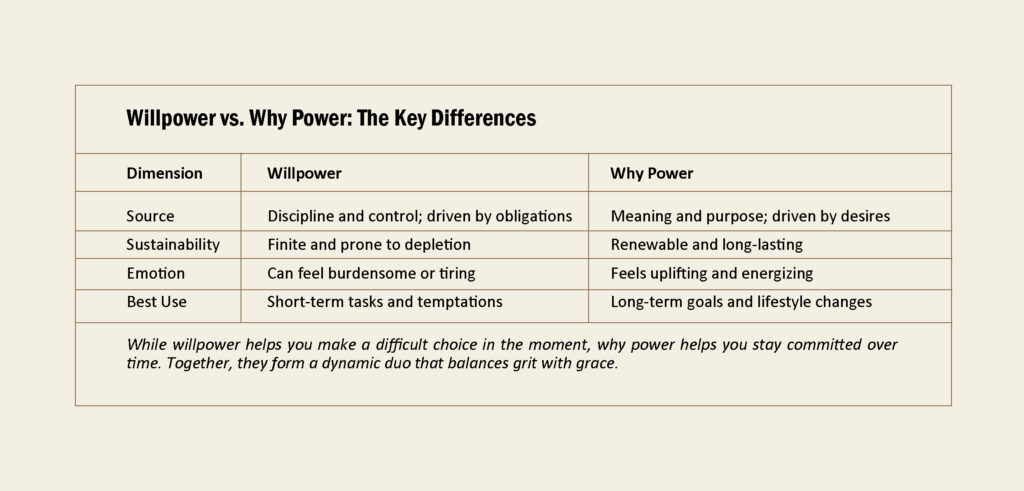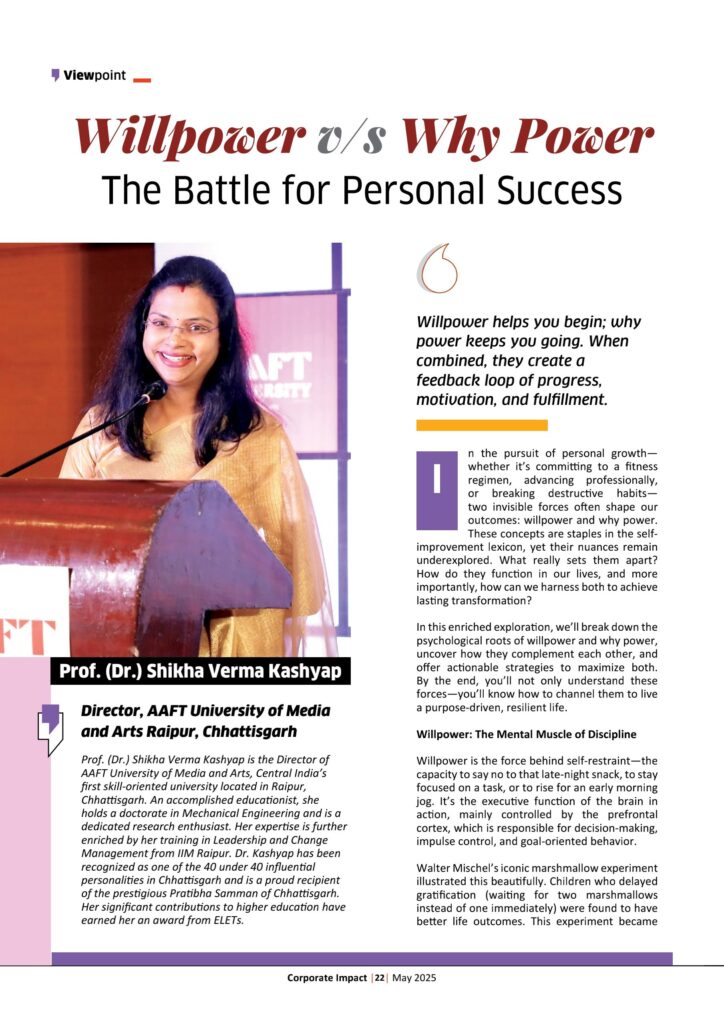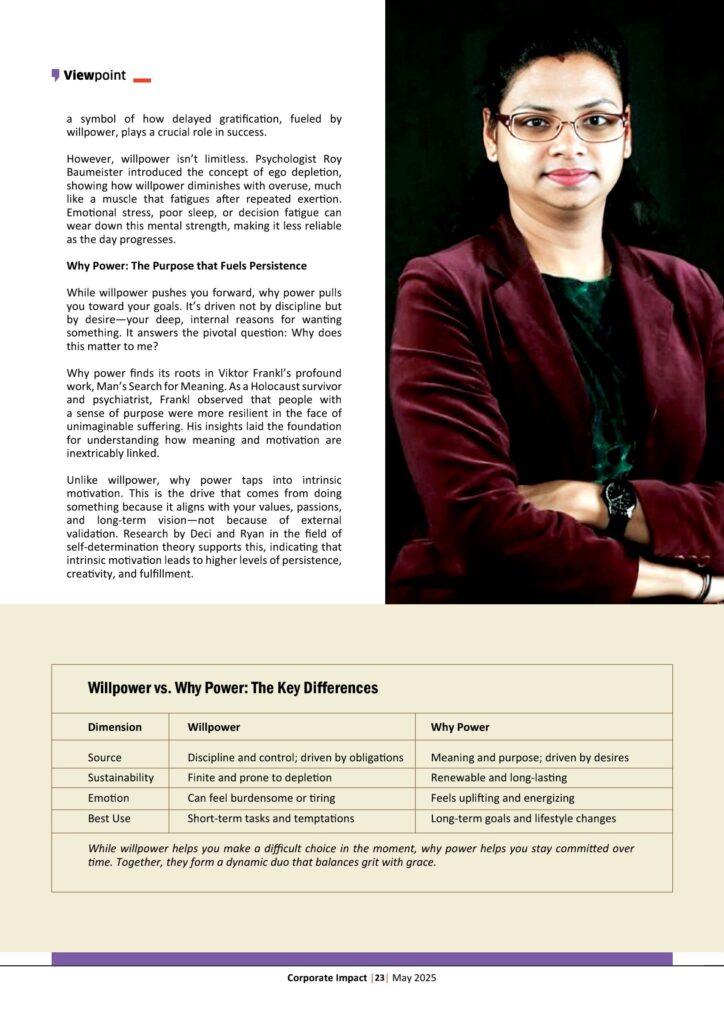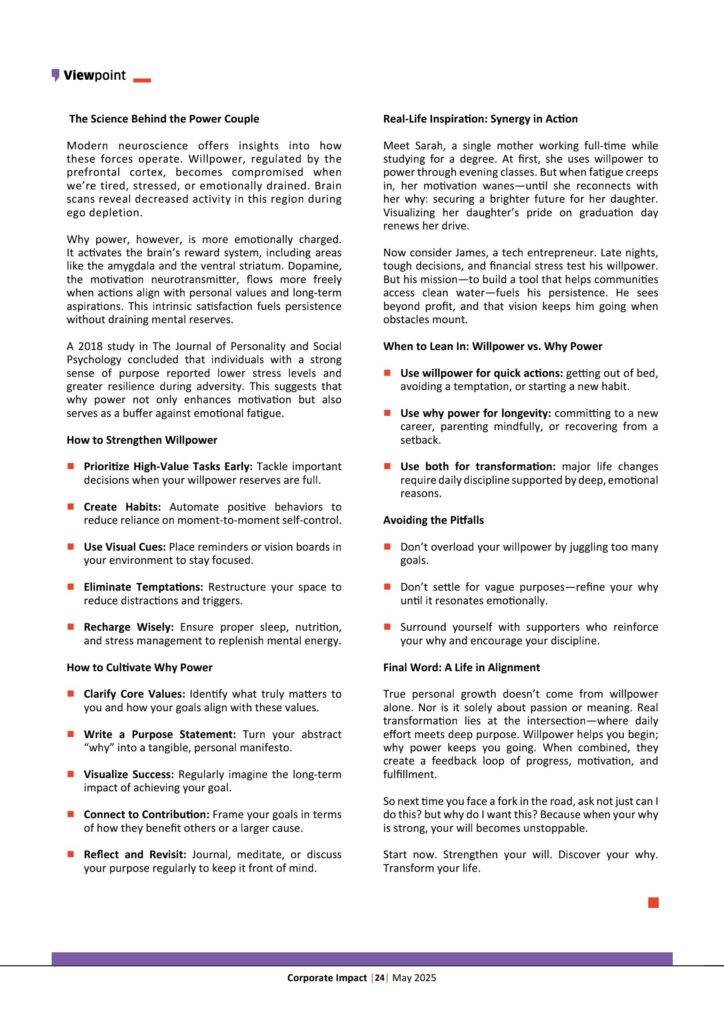Willpower helps you begin; why power keeps you going. When combined, they create a feedback loop of progress, motivation, and fulfillment.
Prof. (Dr.) Shikha Verma Kashyap
Director, AAFT University of Media
and Arts Raipur, Chhattisgarh
Prof. (Dr.) Shikha Verma Kashyap is the Director of AAFT University of Media and Arts, Central India’s first skill-oriented university located in Raipur, Chhattisgarh. An accomplished educationist, she holds a doctorate in Mechanical Engineering and is a dedicated research enthusiast. Her expertise is further enriched by her training in Leadership and Change Management from IIM Raipur. Dr. Kashyap has been recognized as one of the 40 under 40 influential personalities in Chhattisgarh and is a proud recipient of the prestigious Pratibha Samman of Chhattisgarh. Her significant contributions to higher education have earned her an award from ELETs.

In the pursuit of personal growth—whether it’s committing to a fitness regimen, advancing professionally, or breaking destructive habits—two invisible forces often shape our outcomes: willpower and why power. These concepts are staples in the self-improvement lexicon, yet their nuances remain underexplored. What really sets them apart? How do they function in our lives, and more importantly, how can we harness both to achieve lasting transformation?
In this enriched exploration, we’ll break down the psychological roots of willpower and why power, uncover how they complement each other, and offer actionable strategies to maximize both. By the end, you’ll not only understand these forces—you’ll know how to channel them to live a purpose-driven, resilient life.
Willpower: The Mental Muscle of Discipline
Willpower is the force behind self-restraint—the capacity to say no to that late-night snack, to stay focused on a task, or to rise for an early morning jog. It’s the executive function of the brain in action, mainly controlled by the prefrontal cortex, which is responsible for decision-making, impulse control, and goal-oriented behavior.
Walter Mischel’s iconic marshmallow experiment illustrated this beautifully. Children who delayed gratification (waiting for two marshmallows instead of one immediately) were found to have better life outcomes. This experiment became a symbol of how delayed gratification, fueled by willpower, plays a crucial role in success.
However, willpower isn’t limitless. Psychologist Roy Baumeister introduced the concept of ego depletion, showing how willpower diminishes with overuse, much like a muscle that fatigues after repeated exertion. Emotional stress, poor sleep, or decision fatigue can wear down this mental strength, making it less reliable as the day progresses.
Why Power: The Purpose that Fuels Persistence
While willpower pushes you forward, why power pulls you toward your goals. It’s driven not by discipline but by desire—your deep, internal reasons for wanting something. It answers the pivotal question: Why does this matter to me?
Why power finds its roots in Viktor Frankl’s profound work, Man’s Search for Meaning. As a Holocaust survivor and psychiatrist, Frankl observed that people with a sense of purpose were more resilient in the face of unimaginable suffering. His insights laid the foundation for understanding how meaning and motivation are inextricably linked.

Unlike willpower, why power taps into intrinsic motivation. This is the drive that comes from doing something because it aligns with your values, passions, and long-term vision—not because of external validation. Research by Deci and Ryan in the field of self-determination theory supports this, indicating that intrinsic motivation leads to higher levels of persistence, creativity, and fulfillment.
The Science Behind the Power Couple
Modern neuroscience offers insights into how these forces operate. Willpower, regulated by the prefrontal cortex, becomes compromised when we’re tired, stressed, or emotionally drained. Brain scans reveal decreased activity in this region during ego depletion.
Why power, however, is more emotionally charged. It activates the brain’s reward system, including areas like the amygdala and the ventral striatum. Dopamine, the motivation neurotransmitter, flows more freely when actions align with personal values and long-term aspirations. This intrinsic satisfaction fuels persistence without draining mental reserves.
A 2018 study in The Journal of Personality and Social Psychology concluded that individuals with a strong sense of purpose reported lower stress levels and greater resilience during adversity. This suggests that why power not only enhances motivation but also serves as a buffer against emotional fatigue.
How to Strengthen Willpower
Prioritize High-Value Tasks Early: Tackle important decisions when your willpower reserves are full.
Create Habits: Automate positive behaviors to reduce reliance on moment-to-moment self-control.
Use Visual Cues: Place reminders or vision boards in your environment to stay focused.
Eliminate Temptations: Restructure your space to reduce distractions and triggers.
Recharge Wisely: Ensure proper sleep, nutrition, and stress management to replenish mental energy.
How to Cultivate Why Power
Clarify Core Values: Identify what truly matters to you and how your goals align with these values.
Write a Purpose Statement: Turn your abstract “why” into a tangible, personal manifesto.
Visualize Success: Regularly imagine the long-term impact of achieving your goal.
Connect to Contribution: Frame your goals in terms of how they benefit others or a larger cause.
Reflect and Revisit: Journal, meditate, or discuss your purpose regularly to keep it front of mind.
Real-Life Inspiration: Synergy in Action
Meet Sarah, a single mother working full-time while studying for a degree. At first, she uses willpower to power through evening classes. But when fatigue creeps in, her motivation wanes—until she reconnects with her why: securing a brighter future for her daughter. Visualizing her daughter’s pride on graduation day renews her drive.
Now consider James, a tech entrepreneur. Late nights, tough decisions, and financial stress test his willpower. But his mission—to build a tool that helps communities access clean water—fuels his persistence. He sees beyond profit, and that vision keeps him going when obstacles mount.

When to Lean In: Willpower vs. Why Power
Use willpower for quick actions: getting out of bed, avoiding a temptation, or starting a new habit.
Use why power for longevity: committing to a new career, parenting mindfully, or recovering from a setback.
Use both for transformation: major life changes require daily discipline supported by deep, emotional reasons.
Avoiding the Pitfalls
Don’t overload your willpower by juggling too many goals.
Don’t settle for vague purposes—refine your why until it resonates emotionally.
Surround yourself with supporters who reinforce your why and encourage your discipline.
Final Word: A Life in Alignment
True personal growth doesn’t come from willpower alone. Nor is it solely about passion or meaning. Real transformation lies at the intersection—where daily effort meets deep purpose. Willpower helps you begin; why power keeps you going. When combined, they create a feedback loop of progress, motivation, and fulfillment.
So next time you face a fork in the road, ask not just can I do this? but why do I want this? Because when your why is strong, your will becomes unstoppable.
Start now. Strengthen your will. Discover your why. Transform your life.















